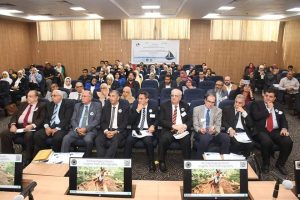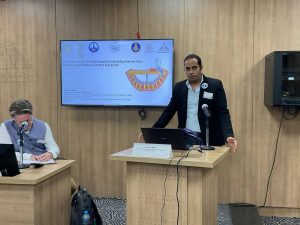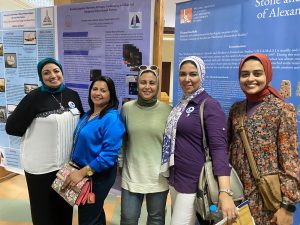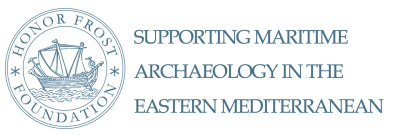Rooting Egyptian Maritime Heritage Congress- 10/29/2023- Ain Shams University, Egypt
Noran Hamed
 On October 29th – 30th, the Faculty of Archaeology- Ain Shams University (Arch-ASU) organised its 3rd Annual International Congress, adopting a theme focused on maritime heritage studies in Egypt, particularly ship and boat building in cooperation with the Egyptian Maritime Salon. The Congress was held with the kind support of the Honor Frost Foundation, providing funds for two keynote speakers, Prof Pascal Arnaud (Université Lyon – France) and Prof John Cooper (University of Exeter – UK), and five bursaries for early career and postgraduate researchers to present their researches in the Congress.
On October 29th – 30th, the Faculty of Archaeology- Ain Shams University (Arch-ASU) organised its 3rd Annual International Congress, adopting a theme focused on maritime heritage studies in Egypt, particularly ship and boat building in cooperation with the Egyptian Maritime Salon. The Congress was held with the kind support of the Honor Frost Foundation, providing funds for two keynote speakers, Prof Pascal Arnaud (Université Lyon – France) and Prof John Cooper (University of Exeter – UK), and five bursaries for early career and postgraduate researchers to present their researches in the Congress.
The event started with welcoming speeches of Arch-ASU representatives and the Secretary General of the Egyptian Maritime Salon, then a keynote lecture by Prof John Cooper on “Ethnographic Research in Shipbuilding”. Seventeen papers and two posters were presented over the two days by 21 participants through four sessions, followed by a round-table discussion on the second day titled “Egyptian Maritime Heritage in Words: Issues and Potentialities of Textual Evidence.” By Prof Pascal Arnaud and Dr Mohamed M Abdel Maguid with the participation of Prof John Cooper.
The recommendations of the Congress are as follows:
- Moving towards implementing the research project “Rooting the Egyptian Maritime Heritage” at the Faculty of Archeology – Ain Shams University, in cooperation with the Egyptian Maritime Salon.
- Supporting further research to study the shapes and names of ships throughout the ages in Egypt.
- Supporting research centres for scholars in maritime archaeology, navigation, and marine engineering to conduct further laboratory and experimental studies to obtain accurate results for calculating the balance and speed of ships throughout the ages.
- Holding a regular conference on rooting the Egyptian maritime heritage in cooperation with the Maritime Salon and other interested organisations.
- Organising excursions to Egyptian maritime heritage sites during the next conference.
- Focus on documenting and inventorying modern shipbuilding methods and linking them to this field’s ancient techniques and traditions.
- Organising experimental workshops to simulate the manufacture of shipbuilding and shipbuilding tools to focus on the technology followed by the ancient Egyptians and its development and enhancement over different historical periods until modern times.
- Shedding light on the importance of analytical studies in the heritage field to extract more information and terminology about the Egyptian maritime heritage.
- Organising regular academic meetings to connect specialists in maritime heritage and establish joint research projects.
The Congress was a successful opportunity for 21 participants from different institutions and organisations in Egypt to present their research projects, exchange knowledge, build networks and benefit from the long experience of the keynote speakers following the HFF objectives:
- To provide grants to independent scholars, individuals working in research establishments and to institutions for work on marine and maritime archaeology.
- To sponsor public lectures and seminars within the field of marine and maritime archaeology.
Moreover, the open/free attendance of the Congress allowed students of different stages (UG/PG) to learn about maritime archaeology in general and Egyptian maritime heritage in particular. Furthermore, the event revealed that several scholars are conducting research in this field in different institutions in Egypt with few collaborations and connections to each other, highlighting the importance of connecting and building knowledge bridges through similar events.
HFF offered serveral bursaries for international and local scholars to attend the event. We have selected a few quotes to show the impact of attending this event on early career researchers.
Sarah Ibrahmim
The grant made it possible for me to travel to Egypt for a symposium on maritime archaeology, which greatly benefited my professional development. As a Ph.D. candidate at Southampton University, this chance promoted my Master’s thesis and helped it gain more respect both in the university and in Egypt. My academic network grew as a result of presenting my research at this global venue, and it also created partnerships that go beyond the conference. In addition to honing my presentation abilities. My thesis has become more widely known as a result of this exposure, expanding its scholarly audience. Consequently, the bursary has played a pivotal role in strengthening relationships, encouraging teamwork, and augmenting my research influence and career proficiencies.
Marwan Fathy
 My role was presenting a paper titled “Fastening Methods in Ancient Egyptian Shipbuilding from Early Dynastic Period until the End of Late Period” This paper was related to one of the congress themes which is “Design and construction of ships in Egypt”. the bursary gave me the opportunity to display my work which allowed me to discuss with the great Archaeologists in this field and exchange experiences such as Dr Mohamed Abd el-Maguid, Mamdouh El-Damaaty, Mohamed Ibrahim, Chiara Zazzaro, Pascal Arnaud, John Coper and some other scholars and colleagues who were interested in this field and also my colleagues from HFF scholars, I got excellent feedback from all of them. they consider my idea a valuable and useful review of the evidence to date, so the bursary allowed me to meet all of them in person.
My role was presenting a paper titled “Fastening Methods in Ancient Egyptian Shipbuilding from Early Dynastic Period until the End of Late Period” This paper was related to one of the congress themes which is “Design and construction of ships in Egypt”. the bursary gave me the opportunity to display my work which allowed me to discuss with the great Archaeologists in this field and exchange experiences such as Dr Mohamed Abd el-Maguid, Mamdouh El-Damaaty, Mohamed Ibrahim, Chiara Zazzaro, Pascal Arnaud, John Coper and some other scholars and colleagues who were interested in this field and also my colleagues from HFF scholars, I got excellent feedback from all of them. they consider my idea a valuable and useful review of the evidence to date, so the bursary allowed me to meet all of them in person.
Azza Moustafa
 Attending the Third International Congress of Faculty of Archaeology at Ain Shams University was a good experince. The congress provided a valuable platform to engage with experts, and gain insights into the aspects of Egyptian maritime heritage.
Attending the Third International Congress of Faculty of Archaeology at Ain Shams University was a good experince. The congress provided a valuable platform to engage with experts, and gain insights into the aspects of Egyptian maritime heritage.
The congress also highlighted the need for further research on the role of ships in ancient Egyptian trade networks and cultural interactions. By analyzing shipwrecks, cargo manifests, and textual evidence, we can gain a deeper understanding of Egypt’s economic and cultural connections with other civilizations. Networking with experienced researchers and fellow scholars was another significant benefit of attending the congress. I had the opportunity to discuss my research with Dr. Chiara Zazzaro. This interaction opened up potential opportunities for future collaboration.
